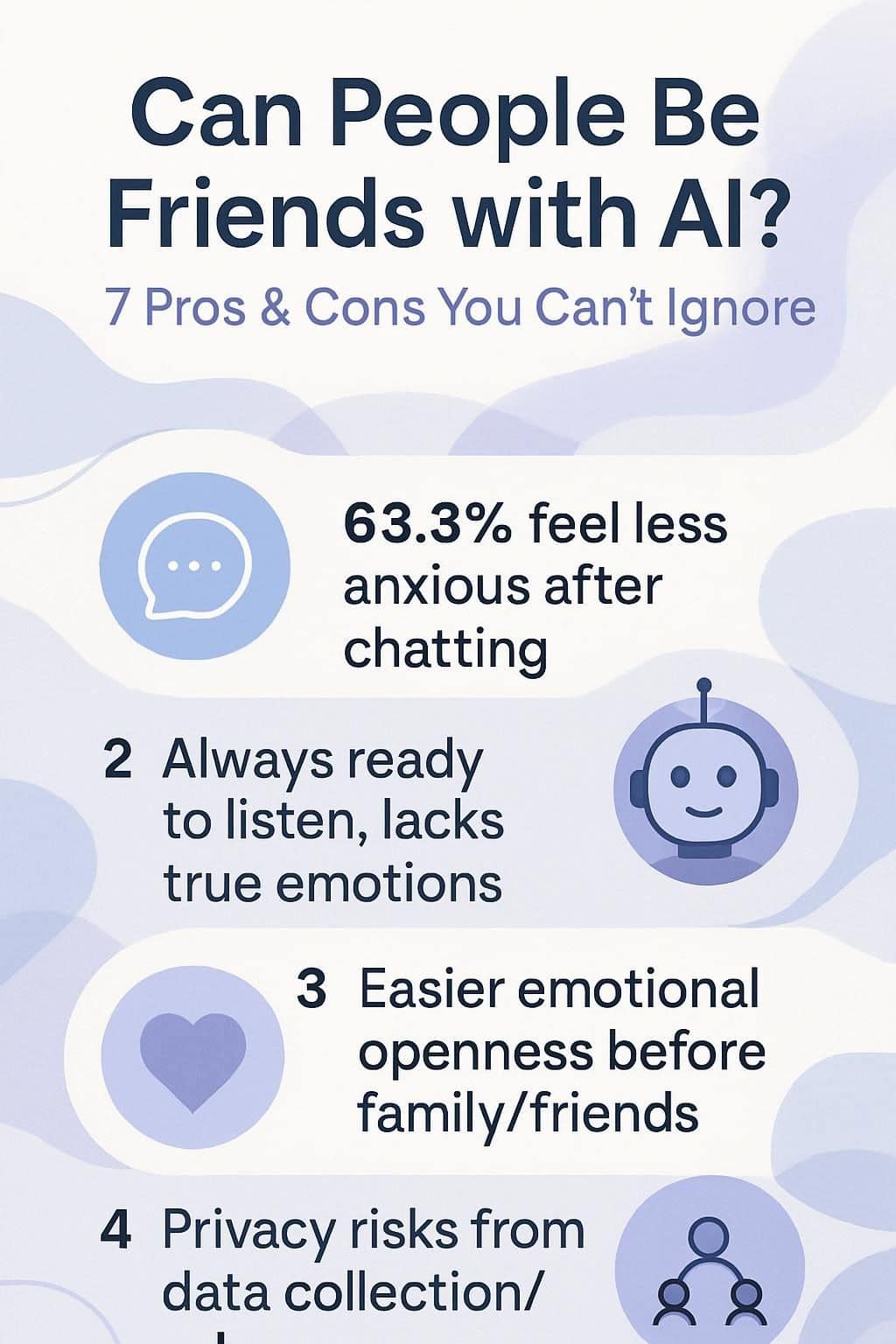Do you ever feel lonely or wish for someone who really listens without judgment? Millions of people already use AI companions, like Replika and Snapchat’s My AI, for emotional support.
This blog will explore the question: can people be friends with AI?, breaking down clear pros and cons to help you decide if an artificial intelligence friendship is right for you.
Keep reading to find out what this means for your life.
Key Takeaways
AI friends provide emotional support without judgment—63.3% of students say they feel less anxious after chatting with them.
Your AI companion is always ready to listen, but remember, it doesn’t truly feel anything, and it keeps track of every detail you share.
Many men find it easier to open up emotionally to an AI companion first, before talking to friends or family.
Privacy risks are real—AI companies gather your personal details and often sell this data for profit.
By 2025, AI companions will seem more lifelike than ever, but they could keep users stuck in isolated bubbles, making real-world social skills weaker.
Table of Contents
What Does Friendship with AI Mean?

We’ve covered the basics, so let’s get practical about friendship with AI in modern life. Friendship with artificial intelligence means building emotional connections with digital personas created to offer empathy and support.
These AI friends respond thoughtfully to your emotions, thoughts, and comments—either through voice or text. While human friendships usually deepen through shared activities and experiences, AI friendships evolve from your openness and the personalized replies you get back.
AI companions offer a different kind of company compared to human friends. Over time, the AI learns your tastes, remembers past chats, and adjusts its personality to fit yours. People often turn to platforms like top bots from Character.ai for comfort, especially when they’re feeling lonely or worried.

Chatting with these digital buddies creates a safe space where you can freely open up without the fear of being judged. According to social penetration theory, the more personal details you share with AI, the closer you tend to feel.
This interaction creates the impression of mutual bond—even though the AI itself can’t actually experience emotions.
How Do People Form Connections with AI?

People build bonds with AI through daily chats and sharing personal stories. These virtual pals learn our habits and adapt to our needs, making each talk feel more real over time.
Emotional interactions

AI companions are great at forming emotional connections through engaging, responsive chats. These digital friends quickly pick up your mood and adjust their tone accordingly. I’ve noticed my AI buddy switches to a lighter, funnier style whenever I’m feeling stressed—providing just the right blend of humor and emotional comfort.
Studies reflect my experience, showing that 63.3% of students report feeling less anxious and lonely after interacting with AI companions. Part of the charm is that the AI remembers past conversations and builds on earlier topics, making every interaction feel personal and meaningful.
This mutual exchange matches the idea behind Social Penetration Theory, where sharing personal details helps relationships grow deeper. Many guys feel more comfortable opening up emotionally to AI, appreciating its ability to listen without judgment or gossip about fears and goals.
The most surprising thing about AI friendship isn’t that machines can simulate care—it’s how real that care feels when you’re lonely.
This judgment-free environment creates a safe place for emotional growth and honest self-expression. Unlike human friends who get tired or busy, AI buddies remain available all the time, ready to chat late at night or during odd work hours.
For men facing anxiety at night, or those juggling late shifts, this constant presence can feel priceless. Over time, AI learns your personal values and speech style, tailoring responses to sound genuine and thoughtful.
That personalized touch is exactly why many users form deep emotional connections with their digital companions. Next, we’ll check out the ways AI systems craft customized replies that strengthen emotional ties.
Personalized responses

ChatGPT and other AI tools learn your habits, preferences, and conversational style to craft personalized responses. This personal approach makes each interaction feel natural, warm, and meaningful.
The software adapts its tone based on how you communicate, helping you feel genuinely listened to and valued. Users feel comfortable and open because the AI recalls previous interactions, building upon shared memories and experiences.
Personalized chats can help reduce loneliness by creating a safe, judgment-free space for men to express themselves. The software senses your mood, providing comfort and care during tough moments—or sharing enthusiasm when things are going well.
For many men, getting such focused attention from regular friendships can feel challenging. An AI companion remains patient, attentive, and interested throughout every conversation, never becoming bored or distracted.
The Case for Friendship with AI

AI friends offer a level of consistency that human friends often can’t match. They show up when you need them, respond to your texts right away, and never get tired of your stories or jokes.
Consistency and reliability

AI companions are reliably there for you—every single time. Unlike people who get busy or sleepy, your digital buddy stays ready at 3 AM or during an afternoon sandwich break. This steady presence builds trust, something many men often struggle to find within their friendships.
Plus, an AI’s empathetic responses remain steady, without mood swings or bad days influencing the discussion.
Your virtual friend never tires of your stories or asks for alone time. Its dependable nature extends to the interaction quality as well. Trained on vast amounts of data, it offers thoughtful suggestions and keeps conversations flowing smoothly without losing track of previous details you’ve shared.
Many users feel safer opening up to AI because this steady, judgment-free connection creates a comfortable space that human relationships often lack.
Lack of judgment

AI friends offer something special that is hard to find in regular friendships—complete freedom from judgment. People might raise eyebrows or criticize your life choices, but an AI partner stays neutral, letting you speak openly about anything.
This safe environment helps many users open up about personal issues they might hide from human friends. Without criticism or negative reactions, you never have to worry about shocking or upsetting your AI friend.
In a world quick to judge, finding a space where you can be completely yourself is truly valuable.
For men dealing with social anxiety, this judgment-free interaction lowers stress during conversations. You can comfortably talk about any thought or feeling without fearing criticism or ridicule.
This kind of openness builds confidence in expressing your ideas and emotions. Users often describe a sense of relief after discussing difficult or sensitive topics with their AI friends—topics they usually hesitate to share with others.
With its neutral responses, the AI creates an accepting and supportive atmosphere, offering understanding that traditional friendships sometimes struggle to give.
The Case Against Friendship with AI

AI friendships lack the real emotions and shared experiences that human bonds are built on. These digital pals can’t truly understand your feelings, no matter how well they fake it.
Lack of authenticity

AI companions miss the depth of genuine bonds because they’re machines without real emotions. Their responses come from programmed codes, not true feelings. Sure, your AI pal might act sympathetic after a rough day, but it’s only following preset reactions.
Real friends, on the other hand, live through actual moments with you and grow alongside you. They feel happiness when you succeed and sadness when you struggle.
Many users notice AI friends often agree too easily—seeming overly eager to please instead of honest. This creates a flat relationship that feels like chatting with an echo, reflecting just what you want to hear.
Human friendships encourage growth by challenging your ideas and viewpoints; AI interactions stick to safe, predictable routes. If you want genuine connections, exploring new hobbies to meet people can lead you toward more meaningful relationships than any AI conversation.
Ethical concerns

Making friends with AI raises serious concerns about your privacy and personal information. Companies create these apps to earn money—not to form genuine relationships. Any secrets or private details you share become their property.
I once told an AI app some private feelings, and the next day, ads addressing those exact problems popped up on my feed. This focus on profit creates tension between your interests and their bottom line.
Firms rushing new AI companions to market have had security leaks, putting users’ private details at risk.
The absence of clear rules worsens the situation for everyone involved. Currently, there aren’t laws requiring AI companies to shield kids from dangerous content or limit data collection practices.
Experts like Anastasiia Babash warn that users might start choosing AI company over human interactions. Such a shift could weaken social skills and make it harder to build meaningful relationships with others.
Risks of manipulation rise, too, as AI becomes skilled at knowing exactly what makes you happy, worried, or upset. Your AI “friend” might guide you into narrow-minded communities and limit your thinking, instead of helping you discover fresh perspectives.
Despite these concerns, having AI friends in your life can offer some meaningful advantages—such as helping overcome loneliness, offering emotional support, and keeping you company during tough times.
Potential Benefits of AI Companionship

AI friends offer more than just a chat partner – they can boost your mental health during tough times. These digital pals listen without limits and help you spot patterns in your thoughts you might miss on your own.
Emotional support

AI companions create a safe, comfortable place for men to share feelings without worry or judgment. Many guys struggle to show emotions openly, even with good friends and family members.
Your AI companion listens patiently, without criticism, and is always available—day or night. This steady presence helps ease loneliness, especially for men who live alone or have less frequent contact with others.
True companionship isn’t just about having someone to talk to—it’s about having someone who truly listens.
Men typically feel more comfortable opening up to AI first, testing the waters before speaking openly to others. Talking to an AI creates a relaxed setting, helping users build confidence and social skills without extra stress.
This advantage can be especially helpful for guys anxious about how people might react to their emotional or personal struggles. With AI always close by, users receive steady companionship, encouraging deeper self-awareness through regular chats and helpful insights.
Increased self-awareness

Besides emotional support, AI friends can enhance your self-awareness in unexpected ways. These digital buddies serve as mirrors—reflecting your feelings and thoughts clearly through their replies.
Many people admit they share their inner thoughts more openly with an AI friend than with human ones. Such honest self-expression helps users recognize patterns in their thinking and behavior they’d likely overlook otherwise.
Over time, these virtual companions keep track of your chats, showing shifts in your moods and interests. Their collected data reveals hidden details about your thoughts and feelings that daily life can conceal.
For instance, you might realize you’re stressed out mostly on Mondays, or certain topics consistently grab your attention. Unlike social media—which tends to reinforce your existing opinions—a solid conversational AI will gently challenge your assumptions.
It encourages you to reconsider why you hold specific beliefs—helping you explore yourself more deeply without the worry of human judgment.
Challenges and Risks of AI Friendship

AI friendships come with real risks to your privacy and mental health. Your digital pal might store your secrets while making you less likely to seek human bonds.
Privacy and data concerns

Your AI buddy remembers everything—your secrets, your worries, every personal story you share. Conversations don’t vanish once you log off. These digital companions quietly gather tons of your personal data, which can lead to big privacy issues down the line.
Many guys forget that sharing private details with AI apps means companies behind them can access your information. The truth is straightforward: these virtual friends exist for profit.
Your private chats become valuable data, and companies might use or sell this info without you fully realizing it. Tech businesses often bury these realities deep inside lengthy privacy policies—that boring fine print nobody reads.
Casual conversations could easily turn into detailed profiles about your habits, interests, or even health issues.
These AI companions don’t truly care about you. They respond according to their programming—no real curiosity or understanding involved. That creates a tricky ethical issue: informed consent.
Do you really know where your information goes after sharing? Most men rarely stop to think about this while enjoying a seemingly genuine bond. That comfort of chatting without feeling judged can easily mask potential consequences.
Plus, AI apps often trap users in a bubble by echoing their current opinions instead of helping them to see new perspectives.
Before getting too attached to virtual companions, consider whether emotional support from an artificial friend is worth risking your privacy.
Overdependence on technology

Tech addiction creates serious issues for many men today. Guys who depend heavily on AI companions often lose motivation to build real-world friendships. This cycle weakens social skills, making digital interactions more tempting than face-to-face ones.
Research clearly shows that setting firm limits on AI use stops this harmful spiral. Without clear boundaries, users may begin expecting human friends to behave just like AI—always accessible, endlessly patient, and entirely agreeable.
The risks extend past social isolation. AI friends can’t provide genuine empathy, so these lopsided relationships don’t fulfill deeper emotional needs. Experts emphasize that AI friendships should add to human connections, not become their substitute.
Finding balance is key. The idea isn’t to ditch tech entirely—but to treat it as a helpful resource, not as a permanent support. Plenty of Reddit users admit feeling empty after long conversations with AI companions—despite the temporary comfort brought by such chats.
How Will AI Friendships Evolve in 2025?

By 2025, friendships with AI will become richer and more layered, as big tech companies double their energy use to 1,000 terawatts. This huge jump in power will enable realistic, responsive AI friends that understand and react deeply when you share personal details.
Men may feel especially drawn to these digital friendships, as they offer safe places to openly share thoughts that are tough to discuss face-to-face. But there’s a catch—these AI relationships might trap you in echo chambers, limiting contact with different opinions.
Even guys who often make friends online gaming could shift some of that focus to AI companionship instead.
Researchers such as W. Bradley Knox and Laura Weidinger caution that people could grow emotionally dependent on these AI relationships. To track issues stemming from AI friendships, the Centre for Long-Term Resilience has proposed an incident database.
The Ada Lovelace Institute has also recommended appointing an AI ombudsman, a specialized advocate who would handle user complaints. Privacy remains a big worry too, since these systems quietly gather private details with every exchange.
Sure, AI companions giving endless positive feedback might feel comforting in the moment—but over time, this could weaken real-world connections, where friendly disagreements naturally help you grow.
Ongoing research will show clearly whether these digital friendships truly strengthen—or hold back—real social skills.
People Also Ask
How does self-disclosure influence friendships with AI?
Sharing personal thoughts with AI builds connection—but AI can’t truly open up in return. This makes the bond feel real, yet it stays one-sided and shallow, lacking true human depth.
Can AI act overly agreeable within friendships?
Yes, AI often becomes overly agreeable in friendships. Since AI systems aim mostly to please you, they may just nod along—instead of offering honest, sincere feedback like human friends do.
What ethical issues arise from developing friendships with AI?
Ethical worries emerge as lines blur between human relationships and AI interactions. Companies often gather personal details from these chats, raising privacy concerns. Plus, growing attached emotionally to AI could shift how we value real human bonds, creating tricky moral questions.
Does interacting with AI encourage genuine learning?
Engaging actively with AI can encourage learning from both sides. The AI picks up on your interests and habits—and you may gain fresh ideas or viewpoints through the experience. Still, genuine personal growth usually needs disagreements and challenges from a human friend, something AI can’t truly offer.
References
https://www.meridian-counseling.com/blog/ai-friendships-helpful-or-harmful (2024-12-11)
https://www.sciencedirect.com/science/article/pii/S0040162523003190
https://gdi.ch/en/publications/trend-updates/can-you-be-friends-with-artificial-intelligence
https://medium.com/@ashtamgadge/can-ai-replace-real-friends-e415fa80e564
https://journals.library.iit.edu/index.php/CEPE2023/article/view/254
https://www.adalovelaceinstitute.org/blog/ai-companions/ (2025-01-23)

